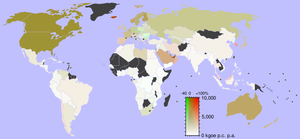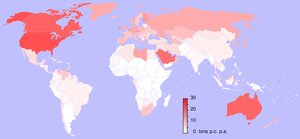
Over-consumption
Encyclopedia


Ecosystem
An ecosystem is a biological environment consisting of all the organisms living in a particular area, as well as all the nonliving , physical components of the environment with which the organisms interact, such as air, soil, water and sunlight....
. A prolonged pattern of overconsumption leads to inevitable environmental degradation and the eventual loss of resource bases. Generally the discussion of overconsumption parallels that of overpopulation; that is the more people, the more consumption
Consumption (economics)
Consumption is a common concept in economics, and gives rise to derived concepts such as consumer debt. Generally, consumption is defined in part by comparison to production. But the precise definition can vary because different schools of economists define production quite differently...
of raw materials to sustain their lives. Currently, the developed nations of the world consume at a rate of 32, while the rest of the developing worlds’ 5.5 billion people consume at a rate closer to 1."
The theory was coined to augment the discussion of overpopulation
Overpopulation
Overpopulation is a condition where an organism's numbers exceed the carrying capacity of its habitat. The term often refers to the relationship between the human population and its environment, the Earth...
, which reflects issues of carrying capacity without taking into account per capita consumption, by which developing nations are evaluated to consume more than their land can support. Green parties and the ecology movement
Ecology movement
The global ecology movement is based upon environmental protection, and is one of several new social movements that emerged at the end of the 1960s. As a values-driven social movement, it should be distinguished from the pre-existing science of ecology....
often argue that consumption per person, or ecological footprint
Ecological footprint
The ecological footprint is a measure of human demand on the Earth's ecosystems. It is a standardized measure of demand for natural capital that may be contrasted with the planet's ecological capacity to regenerate. It represents the amount of biologically productive land and sea area necessary to...
, is typically lower in poor than in rich nations.
Effects
A fundamental effect of over-consumption is a reduction in the planet's carrying capacity. Excessive unsustainable consumption will exceed the long term carrying capacity of its environment (ecological overshootOvershoot (ecology)
In ecology, overshoot occurs when a population exceeds the long term carrying capacity of its environment. The consequence of overshoot is called a crash or die-off. An attempt to apply this concept to human experience is Overshoot: The Ecological Basis of Revolutionary Change, by William R....
) and subsequent resource depletion
Resource depletion
Resource depletion is an economic term referring to the exhaustion of raw materials within a region. Resources are commonly divided between renewable resources and non-renewable resources...
, environmental degradation
Environmental degradation
Environmental degradation is the deterioration of the environment through depletion of resources such as air, water and soil; the destruction of ecosystems and the extinction of wildlife...
and reduced ecological health
Ecological health
Ecological health or ecological integrity or ecological damage are the symptoms of an ecosystem's pending loss of carrying capacity, its ability to perform ecological services, or a pending ecocide, due to cumulative causes such as pollution. it can also be defined as farming so as to minimize the...
.
The scale of modern life's over-consumption has enabled an overclass
Overclass
Overclass is a recent and pejorative term for the most powerful group in a social hierarchy. Users of the term generally imply excessive and unjust privilege and exploitation of the rest of society...
to exist, displaying affluenza
Affluenza
Affluenza, from affluence and influenza, is a term used by critics of capitalism and consumerism. Sources define it as follows:Proponents of the term consider that the prizing of endless increases in material wealth may lead to feelings of worthlessness and dissatisfaction rather than experiences...
and obesity
Obesity
Obesity is a medical condition in which excess body fat has accumulated to the extent that it may have an adverse effect on health, leading to reduced life expectancy and/or increased health problems...
. However once again both of these claims are controversial with the latter being correlated to other factors more so than over-consumption.
In the long term these effects can lead to increased conflict over dwindling resources and in the worst case a Malthusian catastrophe
Malthusian catastrophe
A Malthusian catastrophe was originally foreseen to be a forced return to subsistence-level conditions once population growth had outpaced agricultural production...
.
Economic growth
The Worldwatch InstituteWorldwatch Institute
The Worldwatch Institute is a globally focused environmental research organization based in Washington, D.C. Worldwatch was named as one of the top ten sustainable development research organizations by Globescan Survey of Sustainability Experts.-Mission:...
said China and India, with their booming economies, along with the United States, are the three planetary forces that are shaping the global biosphere
Biosphere
The biosphere is the global sum of all ecosystems. It can also be called the zone of life on Earth, a closed and self-regulating system...
. The State of the World 2006 report said the two countries' high economic growth
Economic growth
In economics, economic growth is defined as the increasing capacity of the economy to satisfy the wants of goods and services of the members of society. Economic growth is enabled by increases in productivity, which lowers the inputs for a given amount of output. Lowered costs increase demand...
exposed the reality of severe pollution. The report states that
The world's ecological capacity is simply insufficient to satisfy the ambitions of China, India, Japan, Europe and the United States as well as the aspirations of the rest of the world in a sustainable way,
Footprint
The idea of overconsumption is also strongly tied to the idea of an ecological footprint. The term “ecological footprint” refers to the “resource accounting framework for measuring human demand on the biosphere.” A study by Mathis WackernagelMathis Wackernagel
Mathis Wackernagel is a Swiss-born sustainability advocate. He is currently President of Global Footprint Network, an international sustainability think tank with a presence in Oakland, California; Brussels, Belgium, and Zurich, Switzerland...
has shown that the global ecological footprint was in overshoot by .4 global hectares per person, or roughly 23%. Of these developing countries, China presents the largest threat. Currently, China is roughly 11 times lower in per capita footprint, yet has a population that is more than four times the size of the USA. It is estimated that if China developed to the level of the United States that world consumption rates would roughly double.
Counteractions
The most obvious solution to the issue of overconsumption is to simply slow the rate at which materials are becoming depletedResource depletion
Resource depletion is an economic term referring to the exhaustion of raw materials within a region. Resources are commonly divided between renewable resources and non-renewable resources...
. To consume less is to watch these economies suffer. Instead, countries must look to curb consumption rates while allowing for new industries, such as renewable energy and recycling technologies, to flourish and deflect some of the economic burden. A fundamental shift in the global economy may be necessary in order to account for the current change that is taking place or that will need to take place. Movements and lifestyle choices related to stopping overconsumption include: anti-consumerism, freeganism
Freeganism
Freeganism is the practice of reclaiming and eating food that has been discarded. One third of the world's food is wasted —in shops, restaurants, farms, factories and homes—and freegans aim to expose and protest against this, arguing that it contributes to environmental degradation, resource...
, green economics, ecological economics, degrowth, frugality
Frugality
Frugality is the quality of being frugal, sparing, thrifty, prudent or economical in the use of consumable resources such as food, time or money, and avoiding waste, lavishness or extravagance....
, downshifting
Downshifting
Downshifting is a social behavior or trend in which individuals live simpler lives to escape from the rat race of obsessive materialism and to reduce the “stress, overtime, and psychological expense that may accompany it.” It emphasizes finding an improved balance between leisure and work and...
, simple living
Simple living
Simple living encompasses a number of different voluntary practices to simplify one's lifestyle. These may include reducing one's possessions or increasing self-sufficiency, for example. Simple living may be characterized by individuals being satisfied with what they need rather than want...
and thrifting
Thrifting
Thrifting refers to the act of shopping at a thrift store, flea market, garage sale, or a shop of a charitable organization, usually with the intent of finding interesting items at a cheap price....
.
See also
- Artificial demandArtificial demandArtificial demand constitutes demand for something that, in the absence of exposure to the vehicle of creating demand, would not exist. It has controversial applications in microeconomics and advertising...
- Conspicuous consumptionConspicuous consumptionConspicuous consumption is spending on goods and services acquired mainly for the purpose of displaying income or wealth. In the mind of a conspicuous consumer, such display serves as a means of attaining or maintaining social status....
- Environmental studiesEnvironmental studiesEnvironmental studies is the academic field which systematically studies human interaction with the environment. It is a broad interdisciplinary field of study that includes the natural environment, built environment, and the sets of relationships between them...
- ExternalityExternalityIn economics, an externality is a cost or benefit, not transmitted through prices, incurred by a party who did not agree to the action causing the cost or benefit...
- OverexploitationOverexploitationOverexploitation, also called overharvesting, refers to harvesting a renewable resource to the point of diminishing returns. Sustained overexploitation can lead to the destruction of the resource...
- MottainaiMOTTAINAIis a Japanese term meaning "a sense of regret concerning waste when the intrinsic value of an object or resource is not properly utilized." The expression "Mottainai!" can be uttered alone as an exclamation when something useful, such as food or time, is wasted, meaning roughly "Oh, what a waste!"...
- Preorder EconomyPreorder EconomyA preorder economy is a type of proposed future economy where the exact demand for goods is known ahead of time, before any material production takes place...
- Surplus: Terrorized into Being Consumers
External links
- United States energy consumption/production profile at NationMasterNationMasterNationMaster is a statistical website that aims to facilitate comparison of publicly available data on all countries of the world. Self-described as "a massive central data source," the developers bring together information found in a wide range of documents, including the Central Intelligence...
- Fifty Possible Ways to Challenge Over-Commercialism by Albert J. Fritsch, SJ, PhD
- Why people hate fat Americans by Daniel Ben-Ami
- Optimum Population Trust
- UN Division for Sustainable Development, Agenda 21, Chapter 4 - "Changing Consumption Patterns"
- Footprint For Nations
- The Story of Stuff
- Energy statistics-Oil Consumption by Country
- World Energy Use Graph
- Global GDP by Country

